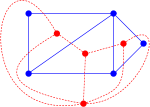|
|
An article published in May in Quanta Magazine had the following remark as its lead:
A surprising new proof is helping to connect the mathematics of infinity to the physical world.
My first thought was that the mathematics of infinity is already connected to the physical world. But Natalie Wolchover’s opening few paragraphs were inviting:
[…]
In 2011 John Horgan posted a piece on his blog, Cross Check (part of the Scientific American blog network), with the title, Why Information can’t be the basis of reality. There Horgan makes the observation that the “everything-is-information meme violates common sense.” As of last December (at least) he hadn’t changed his mind. He referred […]
I just listened to a talk given by Virginia Chaitin that can be found on academia.edu. The title of the talk is A philosophical perspective on a metatheory of biological evolution. In it she outlines Gregory Chaitin’s work on metabiology, which has been the subject of some of my previous posts – here, here, and […]

A recent discovery in the history of science and mathematics has prompted a number of articles, links to which are provided at the end of this text. Astrophysicist and science historian Mathieu Ossendrijver, of Humboldt University in Berlin, made the observation that ancient Babylonian astronomers calculated Jupiter’s position from the area under a time-velocity graph. […]
I’ve been reading Rebecca Goldstein’s Incompleteness: The Proof and Paradox of Kurt Gödel which, together with my finding David Mumford’s Why I am a Platonist, has kept me a bit more preoccupied, of late, with Platonism. This is not an entirely new preoccupation. I remember one of my early philosophy teacher’s periodically blurting out, “See, […]

I’m not sure what led me to David Mumford’s Why I am a Platonist, which appeared in a 2008 issue of the European Mathematical Society (EMS) Newsletter, but I’m happy I found it. David Mumford is currently Professor Emeritus at Brown and Harvard Universities. The EMS piece is a clear and straightforward exposition of […]
Looking through some blog sites that I once frequented (but have recently neglected) I saw that John Horgan’s Cross Check had a piece on George Johnson’s book Fire in the Mind: Science, Faith, and the Search for Order. This quickly caught my attention because Horgan and Johnson figured prominently in my mind in the late […]
I think often about the continuity of things – about the smooth progression of structure, that is the stuff of life, from the microscopic to the macrocosmic. I was reminded, again, of how often I see things in terms of continuums when I listened online to a lecture given by Gregory Chaitin in 2008. In […]
An article in a recent issue of New Scientist highlights the potential partnership between computers and mathematicians. It begins with an account of the use of computers in a proof that would do little, it seems, to provide greater understanding, or greater insight into the content of the idea the proof explores. The computer program […]
In a recent Scientific American article, the late physicist Victor Stenger, along with authors James A. Lindsay and Peter Boghossian argue that, while not acknowledged as such, some interpretations of quantum mechanics are implicitly platonic (with a lower-case p).
We will use platonism with a lower-case “p” here to refer to the belief that the […]
|
|




Recent Comments